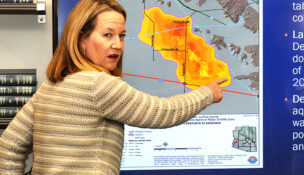Republicans face dissenters in caucus over tax repeal
Arizona Capitol Reports Staff//February 1, 2008//[read_meter]
Republicans face dissenters in caucus over tax repeal
Arizona Capitol Reports Staff//February 1, 2008//[read_meter]
A proposal to permanently keep in place a property tax relief program that, without legislative action, will expire at the end of fiscal year 2009 appears to be in peril in the state Senate.
Republican legislative leaders have made it a priority to repeal the state equalization property tax, but two Republican senators told the Arizona Capitol Times they will not support the move at this time.
Their declaration illustrated a disagreement within the majority caucus over the issue and over the role that taxes and tax cuts play in the overall fiscal health of the state.
On Jan. 31, Republican leadership brought S1002 to the Senate floor for a committee of the whole deliberation, where bills can be amended before the third reading. The bill breezed through on a voice vote with no debate. Democrats registered “no” votes. Republicans voted “yes.”
In separate interviews, Sens. Tom O’Halleran of Sedona and Carolyn Allen of Scottsdale both said they expect a backlash, but added they will stand by what they view as good public policy.
“It’s an election year. It’s a hard decision for myself to make and anybody else that is going to make that decision,” O’Halleran said. “But at some point in time, you have to look at yourself in the mirror and say I have to do what’s right for the state, not just what’s right for my political future.”
The two senators’ votes are crucial to the Republican agenda. With 17 seats, Republican senators have a four-vote advantage over Democrats, who hold 13 seats. A measure needs at least 16 votes to advance. If all Democrats vote against the proposal, with O’Halleran and Allen also saying no, it would lead to a 15-15 tie, in effect dooming the legislation.
Told that their decision could derail the legislation, O’Halleran, R-1, said: “I’m making my decision based on my fiscal responsibility to make sure Arizona is on sound footing to deal with the problems that it is facing.”
Allen, R-8, said: “I am not walking the halls asking the Democrats. I’m standing on what I believe is good public policy.”
Allen said backers of the measure don’t have the votes to move the bill forward.
“And they know they don’t have the votes,” she said.
The two Republicans cited two main reasons why they cannot support the pending legislation: One, the tax is not reinstated until tax bills go out in November 2009. Thus, there is time to act next year.
The tax rate was set to zero for fiscal years 2007, 2008 and 2009. A fiscal analysis provided by legislative research staff stated that the tax would generate $250 million in revenue in fiscal year 2010, in the absence of any legislative action.
Second, to make the repeal permanent at this time would add approximately $250 million to the structural deficit.
But those who back the proposal said allowing the tax to return is tantamount to a tax increase.
“If you refuse to vote for this bill, if the governor refuses to sign it, you are basically signing on for approximately $250 million in a tax increase for Arizonans,” said Sen. Jim Waring, chairman of the Senate Finance Committee and primary sponsor of S1002, the bill that seeks to repeal the equalization property tax rate.
House Speaker Jim Weiers introduced a similar bill, H2220, in the lower chamber. Both measures were approved in committees on a strictly partisan vote, with Republicans in favor and Democrats against.
O’Halleran said if the legislation is to put to vote “early in the session, prior to any discussion at all on the long-term consequences and on the needs of Arizona, then I will be voting no.”
“We cannot continue to go down the path of taking actions that impact the revenue stream of the state piecemeal. You can’t put a permanent tax cut in place this year without understanding the implications, long term, on transportation and on schools,” he said.
O’Halleran lamented that some want to rush to judgment on making the tax cut permanent because it’s an election year. Even next year, one option is to further suspend the tax, rather than permanently repeal it, he said.
It would be a disservice to residents to make the repeal permanent without any debate on other revenue needs of the state, he said.
“We are shifting a burden onto sales tax that cannot be sustained,” he said.
Allen said she is not willing to vote for the “acceleration” of the tax repeal.
She said she has agreed — and will keep her agreement — to vote for it at the time they said they would do it.
“But not now, there is no need now,” she said.
Allen was also upset that S1002 was on the Jan. 29 caucus agenda.
“I think it’s premature,” she said. “The first thing we want to put on the caucus is a way to raise the structural deficit? Now, this does not make logical sense to me.”
She said she thinks one strategy of tax-repeal supporters would be to publicly portray those who oppose the repeal now as legislators who want to raise people’s taxes.
“That’s the only stick they have. They don’t want to talk about (how) it adds to the structural deficit,” she said.
Senate Majority Leader Thayer Verschoor said leadership is “committed to bringing it to the floor” for a third read. He said he believes the vote will take place early next week.
Sen. Ron Gould, R-3, said he thinks they have the votes for it. “I heard some voices that sounded like Republican voices voting ‘nay,’ but I think in the end we will have the votes to do it.”
Allen and O’Halleran said there is no reason for a drawn-out discussion on the subject during the committee of the whole session. They said they will explain their vote on third reading. “I don’t think they will have the votes for third read,” O’Halleran said.
Already, O’Halleran is under fire.
In response to a similar view he had expressed to a newspaper, Steve Voeller, president of the Arizona Free Enterprise Club, criticized the senator for opposing the proposal that the group said will “(prevent) a massive statewide property tax hike.”
“Unfortunately, it looks like Senator O’Halleran prefers to raise taxes on all Arizona property owners in hopes that it will help balance the state’s budget,” Voeller said.
“Why politicians would choose to unbalance the family budget in order to balance the state’s budget is beyond me,” he said. “It is especially surprising that O’Halleran would ask people to pay more in property taxes at a time when the economy is slowing and home values are declining. I can’t think of a worse economic recipe.”
Allen believes the measure is being pushed this time because it’s an election year — a charge that Waring rejected.
He had run the same bill last year, Waring pointed out.
“That wasn’t an election year, was it?” he said.
He said if it did not pass this year, he’ll introduce it again in fiscal year 2009 — if he is still around.
And that underlines Waring’s argument.
After the election in November, the Senate composition could be different. He may not be there, or other members may not be there, he said.
“I don’t see any reason not to pass it this year. And I think we should move forward and try to pass it this year,” he said.
Waring also answered point-by-point the arguments raised by his two Republican colleagues.
“I think some members have added significantly to spending over the years. Do they feel like they added to the structural deficit?” Waring said.
Spending has shot up by $4 billion since 2
003, he said. The state has seen massive population increases and a corresponding demand for services during that time.
“I’m saying spending has contributed more to the structural deficit than this will — by a lot, and it’s not even close,” he said.
“We have increased spending by over $4 billion,” he said last year. “If you are saying we cannot turn around, and give $250 million back to Arizonans, to taxpayers, when they are already hurting with property tax increases, realistically, to say that we are going to go ahead and make things worse, I don’t think that’s acceptable.”
Assistant Senate Minority Leader Jorge Luis Garcia predicted that if the legislation landed on the governor’s desk, she would veto it.
Sen. Paula Aboud, D-28, the highest-ranking Democrat on the Appropriations Committee, said, “This is absolutely a bad move for the state of Arizona. This is bad for education. This is bad in these economic times.”
Senate President Tim Bee said he would not be surprised if there were disagreements in his caucus.
“It’s the beauty of the legislative process,” he said. “It’s designed to bring multiple and diverse opinions together to find solutions.”
Bee told a gathering of lawmakers recently that the repeal of the equalization tax rate is a priority.
The Senate President told the Capitol Times he has not decided when S1002 would be brought to the floor for a vote. The bill got out of caucus without discussion on Jan. 29. Its next stop is the floor.
Asked if the legislation will stand alone or be part of the budget negotiation, Bee said: “Many stand alone-pieces of legislation ultimately become part of the budget negotiations.”
But Senate Minority Leader Marsha Arzberger said, “It cannot stand alone. That particular waiver of a tax happened in the 2006 budget negotiation because it affects revenues of the state, so it always has to be part of it.”

















